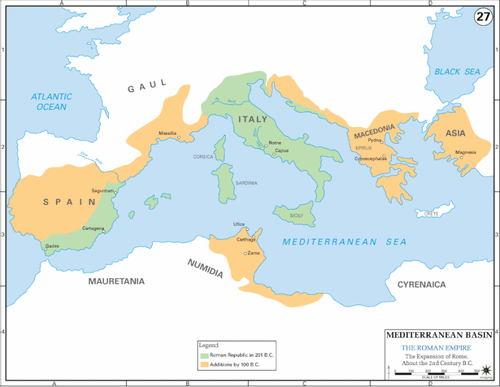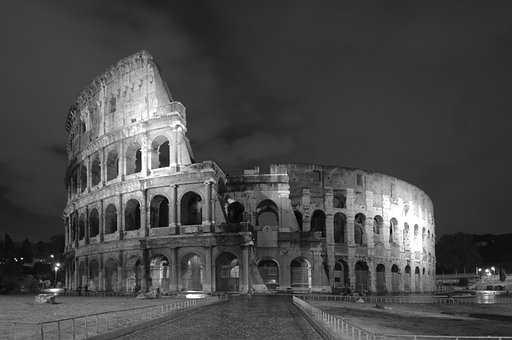Explore the World's Best Ideas
Join today and uncover 100+ curated journeys from 50+ topics. Unlock access to our mobile app with extensive features.
The foundation legends of Rome
- One legend is that Ancient Rome was founded on 21 April 753 BCE by two brothers and demigods, Romulus and Remus. But Romulus killed Remus in an argument of who should rule and then named the city after himself.
- Another legend is that the city was named after Roma, a woman. The fall of Troy caused the survivors to move on. When they landed on the banks of the Tiber River, Roma and other women objected to moving on.
- Others think the city came from Rumon, the name for the Tiber River.
26
208 reads
Early Rome
Rome was a small town on the banks of the Tiber and developed through trade. Seven kings ruled the city as it grew. Greek culture and civilization came to Rome from Greek colonies and gave the Romans a model on which to build their own culture.
From early on, the Romans improved upon the skills and concepts of other cultures. When Lucius Junius Brutus overthrew the last of the seven kings in 509 BCE, Brutus reformed the system of government and established the Roman Republic.
23
148 reads
Ancient Rome: War & Expansion
- Roman warfare made the ancient city a powerful force. The Punic Wars (wars with the North African city of Carthage) helped the city to grow. With Carthage defeated, Rome dominated the region.
- But with growth, the city of Rome started to suffer from the effects of greed and corruption. Unemployed Romans hired themselves out as thugs to whatever wealthy senator would pay them.
- In the 2nd century BCE, Tiberius and Gaius, the Gracchi brothers, led a land and political reform movement.
23
132 reads
Ancient Rome: The optimates and the populares
Rome was divided across the class line. The ruling class called themselves optimates (the best men). They favoured the power of the Senate of Rome and the superiority of the ruling class.
The lower classes were known as the populares (the people). They favoured reform and democratisation of the Roman Republic.
22
96 reads
The end of the Roman Republic
Three men with opposing ideologies unwittingly brought an end to the Roman Republic.
- Marcus Licinius Crassus was the richest man in Rome but also corrupt. Gnaeus Pompeius Magnus and Gaius Julius Ceasar were great generals who made Rome wealthy.
- The three, vying for power, could keep each other in check, but Crassus was killed in battle. With Crassus gone, the First Triumvirate disintegrated, and Pompey and Caesar met each other in battle where Caesar's forces defeated Pompey's.
25
113 reads
Julius Caesar's reign and death
- Julius Caesar ended the period of the Republic by having the Senate proclaim him dictator. He was popular among the people and created a strong and secure central government that increased prosperity for Rome.
- He was assassinated by a group of Roman senators in 44 BCE. They feared that he was becoming too powerful and might abolish the Senate.
- Marcus Antonius (Mark Antony), Gaius Octavius Thurinus and Marcus Aemilius Lepidus joined forces and defeated the senators in 42 BCE.
22
111 reads
Towards Empire
- Octavian, Antony, and Lepidus formed the Second Triumvirate of Rome. They were all very ambitious.
- It was agreed that Lepidus should rule over Hispania and Africa, Octavian should rule the Roman lands in the West and Antony the lands in the East.
- Antony was involved with the Egyptian queen Cleopatra VII and caused a war with Octavian. Octavian emerged as the victor and sole power in Rome. In 27 BCE, he was granted extraordinary powers by the Senate and took on the name of Augustus, the first Emperor of Rome.
24
116 reads
IDEAS CURATED BY
Joanne (Jo)'s ideas are part of this journey:
Learn more about history with this collection
The historical significance of urban centers
The impact of cultural and technological advances
The role of urban centers in shaping society
Related collections
Similar ideas
5 ideas
What was life like in ancient Rome?
bbc.co.uk
1 idea
Caesar's civil war - Wikipedia
en.wikipedia.org
4 ideas
Roman law | Influence, Importance, Principles, & Facts
britannica.com
Read & Learn
20x Faster
without
deepstash
with
deepstash
with
deepstash
Personalized microlearning
—
100+ Learning Journeys
—
Access to 200,000+ ideas
—
Access to the mobile app
—
Unlimited idea saving
—
—
Unlimited history
—
—
Unlimited listening to ideas
—
—
Downloading & offline access
—
—
Supercharge your mind with one idea per day
Enter your email and spend 1 minute every day to learn something new.
I agree to receive email updates

